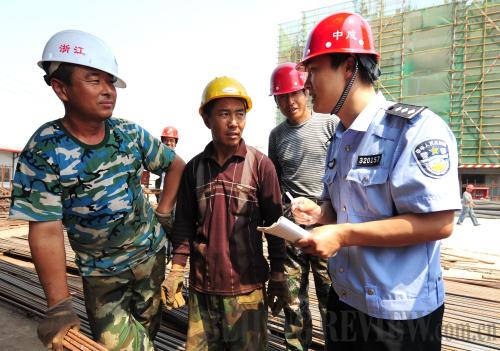|
 |
|
ON-SPOT HELP: A policeman consults migrant workers on their needs at an engineering project site in Tianjin. The government has intensified efforts to address concerns of migrant workers (LIU HAIFENG) |
Tougher Task
In the second quarter of 2010, China overtook Japan as the world's second largest economy. But the Ministry of Commerce says China still has more than 150 million people living below the international poverty line of less than $1 a day.
China has achieved much in economic development, but there are still a lot of challenges ahead, such as striking imbalances between rural and urban areas and between different regions and different groups of people.
The acknowledgment of the huge impoverished population gives a true picture of China's reality. Although the country has developed a set of ways of poverty reduction, a lot of work still lies ahead. To carry on with the work and to formulate effective policies, we must first realize the reality.
Greater resources should be invested in poverty relief efforts. After all, the ultimate goal of China's development is to have its people, especially the large poor population, live rich lives.
The First
Taxing Families
Yang Yiyong, an official with the National Development and Reform Commission, recently said adjustments to the cutoff point of individual income tax were not reform in any real sense, and what China needs is a taxation system based on family, not on individual, income.
Reforming the current individual income taxation system is only a matter of time. In 2008, low- and middle-income earners paid over 65 percent of the country's tax revenues.
The loopholes in the individual taxation system are striking. First, one who has only a single income source pays more than those who have many sources. Second, even if two people's family burdens differ, they have to pay the same taxes as long as their incomes are identical. To adjust the tax cutoff point will never remove this unfairness. The cutoff point does need to be raised, but taxing family, instead of individual, income is more effective.
The most difficult technical problem for family-based income taxation is how to set up an online taxation platform to ensure the authenticity of individual incomes and differentiate families' economic burdens. Some taxation experts claim taxing on a family basis is a high-cost job, but is the current taxation system economical? Maybe China's macro tax burden is lower than industrialized countries', but how about the tax burden on each citizen? Are calls for individuals' tax burden reductions loud enough? Technical problems should never be used as excuses to reject or delay real individual income tax reform.
Guangzhou Daily
Unnecessary Golf
Golf has always been regarded as an expensive sport, but in recent years, many schools have opened golf classes allegedly to boost students' overall development. Recently, a school in southwest China's Chengdu, Sichuan Province, required all its students to take golf as a compulsory class in the semester beginning in September.
No one doubts the huge expense golf classes and attached facilities demand. It's not something ordinary people can afford to do. So if the golf class is offered as an option, it is acceptable. But when every student is forced to take it, and pay for it, it is unreasonable. To build a standard golf course costs about 500 million yuan ($74 million), plus huge maintenance fees every year. Even a training course may cost 30 million yuan ($4.41 million). Where does the money come from? The students or, rather, their parents. Students' overall development can be achieved in many ways. What the students need is a proper mode suiting their conditions. At least in China, for now, golf is only a rich persons' sport. To blindly keep up with fashion, without paying attention to students' economic burdens, is by no means what a school should do.
Yanzhao Evening News
Salary Defaults
To work and to get paid, this is the universal rule. But in China, a large number of farmer-turned-workers may find themselves penniless after a whole year's hard work and sometimes even be humiliated by their employers when they attempt to claim defaulted wages. Against this background, the Standing Committee of the National People's Congress, China's top legislature, is considering to list "intentional salary defaults" as a crime when deliberating an amendment of the Criminal Law.
Some employers steal or embezzle migrant workers' wages and refuse to pay for their social security, using excuses such as poor business performance. Sometimes they even run away without paying workers' wages.
China's current Labor Law does not have detailed articles to deal with intentional salary defaults. So, despite the government's efforts to help migrant workers, salary defaults keep happening, which damage labor relations and social harmony. In every sense, it's necessary to define "intentional salary defaults" as a crime.
Xinhua Daily Telegraph
| 